

Take Some Notes by YellowBear
June 1st, 2007 1:36 AM
I actually documented and completed this task on accident, Here's how...
A little while ago one of the gentlemen that I work with got himself a Rubik's Cube to help kill the boring mid day hours. I’m sure everyone has seen one of these at somepoint in their life. My grandparents had one and I never paid it much attention. They are always sort of around. Perhaps egged on by my boredom I found myself picking it up and just tinkering a little but. At first just a twist here and there, then more and more. After a few maddening days filled with twisting and wrestling, turning and unturning trying to make it all come together, I was defeated. I got frustrated and turned to the internets to devise a proper strategy to go about getting it done. That is to say I didn’t want to know exactly move for move how to solve it, just a basic explaination of how to move one section of the cube from say the lower left of one side to the upper right corner on the next side. During the course of this investigation I came across the article on them in Wikipedia. I was startled to read:
“In fact, there are (8! × 38) × (12! × 212) = 519,024,039,293,878,272,000 (about 519 quintillion on the short scale) possible arrangements of the pieces that make up the Cube, but only one in twelve of these are actually reachable. This is because there is no sequence of moves that will swap a single pair or rotate a single corner or edge cube. Thus there are twelve possible sets of reachable configurations, sometimes called "universes" or "orbits", into which the Cube can be placed by dismantling and reassembling it.” - http://en.wikipedia.org/wiki/Rubik's_Cube
Holy SH*T!!! 519 Quintillion!!! How big is that, my brain doesn’t even understand?!? 519 billion billion. What does that mean?!?! Even if only one in twelve is a reachable state, that makes 43.25 quintillion actually achievable configurations.
Since my feeble, puny, pathetic brain couldn’t actually believe or understand what type of a number that represented I begin to think of other really large numbers of things that I could figure out to try and give it some context. And so, I began taking notes.
I began by wondering how the Rubik’s cube number compared to the number of millimeters between the earth and the sun. That work can be seen across the bottom of the white board. I knew that it takes light 8.31 minutes to get to earth, and that the speed of light is 299,792458 meter per second. Following that through, I found the sun to be a disappointingly small 149 trillion millimeters from the earth.
I know that sounds like a large number, but lets review the number of zeros involved
519,000,000,000,000,000,000
149,000,000,000,000
Six zeros is a very big difference. The number of combinations on a Rubik’s cube is a million times greater than the distance from the earth to the sun in millimeters!?! HAVE I GONE COMPETELY INSANE!?! IT”S A 3X3X3 FRICKING CUBE!!! What can be that big?
Undaunted I set out in search of larger numbers. Now I admit at this point my calculations get much more approximate, but I feel that for the purposes of approaching the correct orders of magnitude they are close enough. My mind began to wander towards bigger questions… How many grains of sand are there on the earth? A quick search yielded a few websites which began to approach the question in an appropriate way. This seems like the right idea:
http://www.hawaii.edu/suremath/jsand.html
I accept these numbers again only as approximations but I agree somewhere near 7.5 quintillion grains of sand on the earth seems plausible. That is 7.5 x 10^18 or 7.5 billion billion. Impressive yes, but 100 times smaller than the number of all possible Rubik’s cube combinations, and five times smaller than the number of actually achievable (without dismantling and reassembling) configurations. Rubik wins again, no wonder I couldn’t solve the damn thing. So my quest for yet larger numbers continued, note taking all the while so I could compare these numbers side by side as I was trying to figure them out.
After sand I inevitably became curious about the number of stars in the universe. Google helped me out again. They essentially said we have approximately 400 billion stars in the Milky Way galaxy, with at least 40 billion galaxies.
http://answers.google.com/answers/threadview?id=539329
Debate over this obviously gets heated amongst internet trolls, I don’t really care, I feel safe in assuming we land somewhere near 600 quintillion stars in the universe. That is almost 100 for every grain of sand, but relatively not that much larger than the number of combinations possible on the Rubik’s cube. Very impressive for a small little stupid toy.
Feeling pretty good with myself for finding something at least in the same ballpark as the massive Rubik’s number I felt that I had certainly given myself the type of perspective that I had been looking for. But perhaps intoxicated with the sweet sweet liquor of knowledge I decided not to let my note taking stop just because I had found something equal to the cube. I had to find something larger. And I am happy to tell all of you that I found a number twice as large or perhaps even larger than all of the ones I have mentioned so far. My notes show the number of molecules comprising the earth to be near 1.1 x 10^44 I can’t reconstruct my exact sources on this, but I found this link which places the number even higher, somewhere near 1x10^50 for the number of atoms in the earth
http://education.jlab.org/qa/mathatom_05.html
The Rubik’s cube remains the largest discreet number that I think I have ever contemplated, but the others are very impressive to me as well. Anyway, the point is I took notes. I hope you all learned something, I know I did. Dare to ask the stupid questions, and take notes!
Here is one more link for those who can’t get enough Rubik.
http://web.usna.navy.mil/~wdj/rubik_nts.htm
To be honest with you fine people of the sf0 community, I still don’t feel satisfied, I am thinking about taking some more notes right now before your very eyes. Yes, I am opening my web browser in another window. I have more to say.
The Earth is ~ 4,500,000,000 years old (4.5 Billion (wikipedia says so))
That is ~1,642,500,000,000 days old (1.64 Trillion)
Or ~39,420,000,000,000 hours old (39 Trillion)
A.K.A ~2,365,200,000,000,000 minutes old (2.36 Quadrillion)
And ~141,912,000,000,000,000 seconds old (141 Quadrillion)
THAT MEANS IF YOU DID ONE RUBIK’S CUBE COMBINATION EVERY SECOND SINCE THE EARTH CAME INTO EXISTENCE, YOU WOULD NOW BE ~1/3657th of the way to doing all of the “possible arrangements”, and ~1/305 of the way if you don’t plan to take your cube apart and only do the “reachable” configurations.
If you started doing ONE combination PER SECOND when the universe began
13.7 billion years
5,000,500,000,000 days (5 trillion)
7,200,720,000,000,000 minutes (7.2 quadrillion)
432,043,200,000,000,000 seconds
You still wouldn’t have gotten the cube into every “possible arrangement”
So amazing for such a little cube! I still don’t believe it. I hope I am just bad at math. Next time you see one of these take a moment to appreciate its possibilities, and
Take Notes.
12 vote(s)

anna one
5
Ziggy C.
5
Zhee Meatss Needz Cheffing
5
Lizard Boy
5
Lank
5
Murdoc
5
Blue
5
Sean Mahan
5
K!
5
Bex.
5
Spidere
5
Tricia Tanaka
Terms
(none yet)14 comment(s)
Freakin' awesome read. It blows my mind, as well.
"Meanwhile, on a bench in Villette Square, Félix Lerbier learns there are more links in his brain than atoms in the universe."
That is a quote from the movie Le Fabuleux destin d'Amélie Poulain, or as it's known in the States, simply Amélie. Now there is a number that I can't even begin to comprehend. I question the validity behind the statement itself, but it's still interesting to think about.
I em cumpletely flebbergested by zee incredeeble-a noombers thet ixeest in zee vurld ooff strunge-a interteeenment oobjects. bork de bork bork, bork! Iff oonly ve-a vere-a ell su loocky tu stoomble-a upun sooch idees by poore-a heppenstunce-a. I vuoold be-a less leeke-a a veeldebeest und mure-a leeke-a a pruper cheff!
Fur ifery Roobeek's cumbeeneshun in thees vurld, zeere-a is oone-a heppy ieter ooff Svedeesh Cheff puncekes, yuoo gut thet reeght. Um de hur de hur de hur. I em a greeter noomber thun yuoor demneeng coobe-a, seelly buy. Bork bork bork!
Zeen egeeen I intuxeecete-a myselff regoolerly veet zee sveet leeqoour ooff leeqoour et must muments und generelly feel qooeete-a boombleeng. Boombleeer thun a tea cuzy fettened oon creem und creempets. Yes, thet's reeght. Creezy creempetties. Um de hur de hur de hur.
Another fun one for stuff like that is randomized code breaking.
Incidentally, have you attempted calculating the rubik's cube numbers yourself?
Sorry Lizard Boy I was in band, not the math club. I don't even want to touch those calculations. I think I am more likely to understand that reality with interpretive dance than numbers. Incidentally 519 quintillion won't even fit into the calculator that comes on my computer. that is partially why the note taking began in the first place.
*edit: I thought you would also all like to know that the cube can always be solved in 27 face turns or less, regardless of how jumbled it is.
http://en.wikipedia.org/wiki/Optimal_solutions_for_Rubik's_Cube
And Just for Ziggy C. I got these, which estimate total atoms in the universe to be in the 1x10^79 - 1x10^81 range. So much huger than is possible to comprehend
http://www.madsci.org/posts/archives/oct98/905633072.As.r.html
http://en.wikipedia.org/wiki/Observable_universe
http://www.astronomycafe.net/qadir/q1797.html
But sadly
"The human brain has a huge number of synapses. Each of the 1012 (trillion) neurons (including glial cells) has on average 7,000 synaptic connections to other neurons. It has been estimated that the brain of a three-year-old child has about 1016 synapses (10 quadrillion). This number declines with age, stabilizing by adulthood. Estimates vary for an adult, ranging from 1015 to 5 x 1015 synapses (1 to 5 quadrillion).[5]"
http://en.wikipedia.org/wiki/Neuron
I love that movie
http://youtube.com/watch?v=wQJ_6ba2r-0
To Lincoln..
The cube is very methodical; so methodical that there are set "methods" of solving it. I used to be able to solve any cube in a few minutes, but that was because I had memorized a simple method of solving it, and not because I'm smart. Obviously, you wouldn't just wade through the combinations hoping to find the solved one... You're only looking for one combination, and there are only so many ways to get there from any other combination.
To YellowBear..
Thanks for the extra research! Out of curiosity, what instrument did you play in band?
In elementary school I began by trying out (unsuccessfully) the clarinet. Then In middle school I started with bass in the jazz band. Then guitar in high school. In college I picked up piano, banjo, mandolin, dobro and voice. Now I will play (try) on anything that makes sounds, instruments or otherwise.
You took notes that are actually interesting! Excellent.
This makes me think though, that it's much easier to reach large numbers when you are talking about possibilities rather than actualities. Simple things can quickly multiple into ridiculous numbers of possibilities. For example, consider yourself as a child of two specific parents. Compare the number of possible individuals that could have been born to those parents to the number of actual children...
Bummer, someone tossed a rondom vote to the other Note taker's completion and my Fleur Di Lys is gone. Sad faces. oh well, so it goes...
This is way more interesting than any thinking I've ever done near any pipe. I feel smarter already, even if my synapses are dying off with every one of earth's seconds that pass me by...
My Hero Indeed! I guess you just arn't near pipes and me at the same time.

Ahem, very dapper...
I particularly like the phrase "the largest discrete number I have ever contemplated" and rongo rongo/nuclearpolymer's comment that "it's much easier to reach large numbers when you are talking about possibilities rather than actualities". Vote for giving me ideas in my head I'd never considered before! I love it when that happens.
When I think of big numbers, I usually think of the number of possible games of chess, though apparently there's some debate on that. Considering that I've learned to really enjoy the game of Go in the last several years, I also found an interesting page talking about the number of possible games of Go.






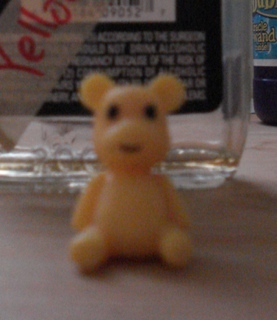










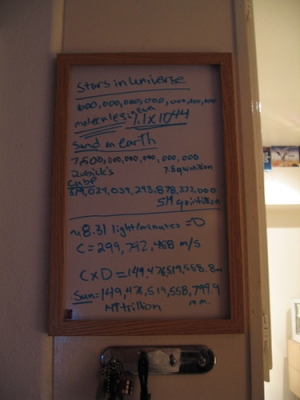
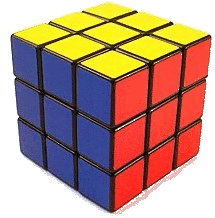
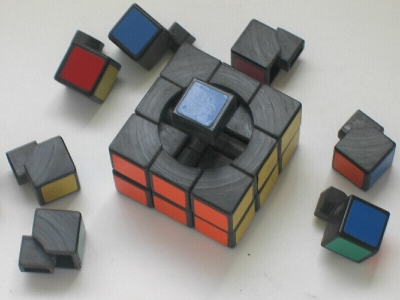
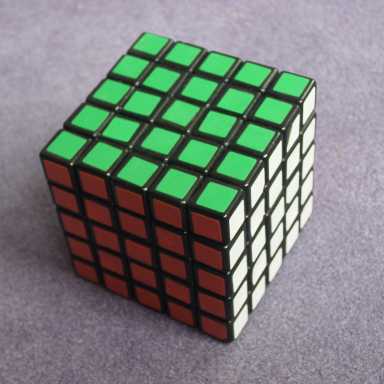








insanity.